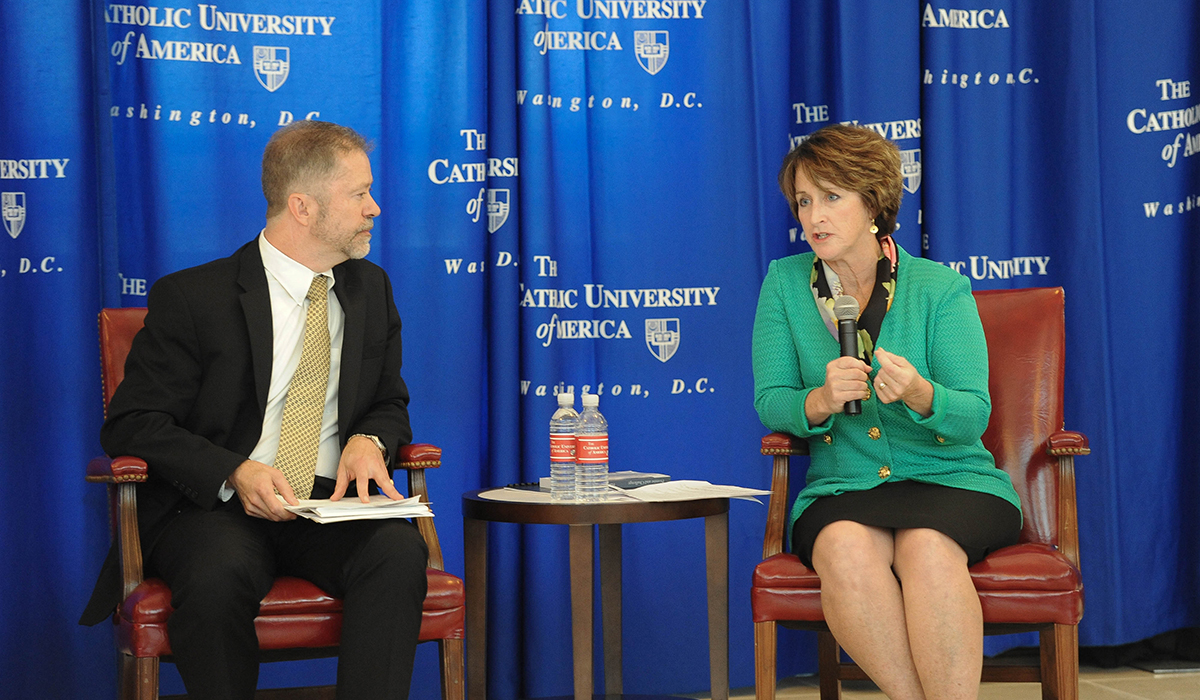

Three scholars shared their support for the Catholic Church’s teachings on human sexuality and contraception Tuesday, Sept. 20, during a press conference held at The Catholic University of America in Washington, D.C.
The press conference marked the release of the statement, “Affirmation of the Catholic Church’s Teaching on the Gift of Sexuality,” which was signed by more than 500 Catholic scholars from around the country, including Catholic University President John Garvey. Intended as a response to recent calls for church teachings to be changed, the statement echoed teachings articulated by the 1968 papal encyclical Humanae Vitae.
The press conference included discussion of the statement and analysis of the claims made by the Wijngaards Institute for Catholic Research, which recently released an opposing statement “On the Ethics of Using Contraceptives,” arguing that contraceptives can be used as prophylactics in a morally legitimate or morally obligatory way.
Among the panelists at the event was John Grabowski, associate professor of moral theology and ethics who served as an expert at the 2015 Synod of Bishops on the Family. Grabowski opened the press conference by discussing how the statement reflects an “articulation of the fact that there are many Catholic scholars, academics, and intellectuals who support the Church’s teachings, and who recognize the teaching is not a policy instituted by the Church 48 years ago, but that it represents the constant teachings of the Church from the beginning.”
“In fact, until the 20th century, (a stance against contraceptives) was the teaching of every Christian church and every theologian,” he said. “It was only as the 20th century went on that we lost some of that unified voice.”
Grabowski added that, although it was Pope Paul VI who is best known for speaking against contraceptives, his ideas have been reflected and revisited by many popes serving after him, including Saint John Paul II, Pope Benedict XVI, and Pope Francis.
Mary Hasson, director of the Catholic Women’s Forum at the Ethics and Public Policy Center, which cosponsored the conference, spoke of how she believes the Church’s teachings on sexuality and contraception are beneficial for women, many of whom have been conditioned by modern society to think of their own fertility as a “design flaw.”
“From a woman’s perspective, contraceptive, abortion, the sexual revolution were held up to be a situation of promise, opportunity, a way to move forward in equality,” she said. “What we found is not looking just through the eyes of faith, but our lived experiences has shown that this is a false promise, and in fact women have proved to be hurt and more vulnerable by the consequences of the sexual revolution and the contraception promotion as the solution.
“What women have discovered in the past 48 years is that we don’t have a design flaw; that in fact being a women is good enough and it’s a wonderful thing, and it’s time to embrace that,” she continued. “That is the vision the Church has had for ages.”
Janet Smith, who holds the Father Michael J. McGivney Chair of Life Ethics at Sacred Heart Major Seminary in Detroit, also addressed the audience, via an audio connection. She noted that the statement reflects a much larger group of Catholics who feel passionate about Church teachings.
“The people who have signed our document, almost all of them are people with families,” she said. “They are living the Church’s teachings, they understand the Church’s teachings, and they accept the Church’s teachings.”
For more information or to read the statement “Affirmation of the Catholic Church’s Teaching on the Gift of Sexuality,” go to http://trs.cua.edu/humanae-vitae/.